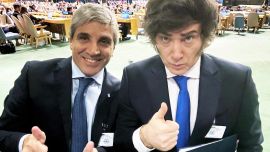A major trade deal between the European Union and Latin American economies won’t be signed next week as hoped, as additional commitments will require the approval of Argentina’s incoming president Javier Milei.
Brazil, which holds the rotating presidency of the Mercosur bloc – which includes Uruguay and Paraguay as well as Argentina – informed the EU delegation on the sidelines of the United Nations’ COP28 climate summit in Dubai that it won’t be possible to get the trade agreement over the finish line as officials had expected, people familiar with the matter said.
The EU-Mercosur agreement would create an integrated market of 780 million consumers, making it the largest in the European bloc’s history and one of the world’s biggest free-trade pacts.
The deal would also pull the two regions closer amid a broader global competition for influence in which China and Russia have sought to make inroads in resource-rich nations across the Americas.
There was optimism on both sides about concluding the pact quickly following significant progress in technical negotiations that moved them closer to tackling environmental differences that derailed a previous iteration in its final stages.
European Commission spokesperson Olof Gill said that both parties are “engaged in intense and constructive discussions” and “substantial progress has been made in the past months.” He added that “negotiations will continue in a constructive spirit with an ambition to conclude as swiftly as possible.”
Following the change of plans, a EU delegation led by Valdis Dombrovskis, the European Commission vice-president for trade, won’t travel to Rio de Janeiro for the Mercosur summit on December 7, according to the people, who requested anonymity because they weren’t authorised to speak publicly.
Still, after meeting on Friday with Brazilian President Luiz Inácio Lula da Silva on the sidelines of COP28, European Commission President Ursula von der Leyen said that the “EU is committed to getting this deal done.”
Milei criticised Mercosur during his election campaign, raising doubts about the agreement’s prospects. But incoming Foreign Minister Diana Mondino told Bloomberg on November 29 that the new administration wouldn’t derail the agreement and wanted to see a conclusion “soon, hopefully before December 7.”
Officials remained cautious recently as talks entered a critical phase with important outstanding issues still to solve. Last-second surprises were also a worry after so many close calls, Bloomberg previously reported.
Those issues include Brazil’s push to use its own deforestation data and a compensatory mechanism in case a country unilaterally restricts imports of Brazilian products, one person familiar with the negotiations said.
Argentina also wants funds to help adapt to environmental demands, and has insisted on phasing out tariffs on imported electric vehicles more slowly to help it reshape its domestic automobile industry, the person added.
Still, negotiators agreed there was a good opportunity to conclude the deal as Spain, a big supporter of the agreement, was chairing the rotating presidency of the EU and Lula was pushing to finalise the agreement before Brazil’s Mercosur presidency ends.
Belgium, which will take over the EU helm next semester, has faced criticism about trade deals from its southern Wallonia region. In any event, the European bloc’s legislative activity is set to slow down from spring ahead of EU elections in June.
In 2019, the two sides concluded 20 years of technical negotiations with a preliminary agreement. Yet that pact wasn’t finalised after some EU states raised concerns about rising deforestation rates in the Amazon rainforest under Jair Bolsonaro, president of Brazil at the time. The EU asked for additional environmental guarantees and in return considered some targeted demands from Mercosur, including on issues of government procurement.
The agreement would save European exporters about €4 billion (US$4.4 billion) in import tariffs while providing links to suppliers of critical materials for the development of green and digital technologies. For South America, it promises a jolt to industries seeking expanded access to European markets and an agricultural sector that already drives the region’s status as a top exporter of beef, soybeans, coffee and other products.
related news
by Jorge Valero, Bloomberg
























Comments